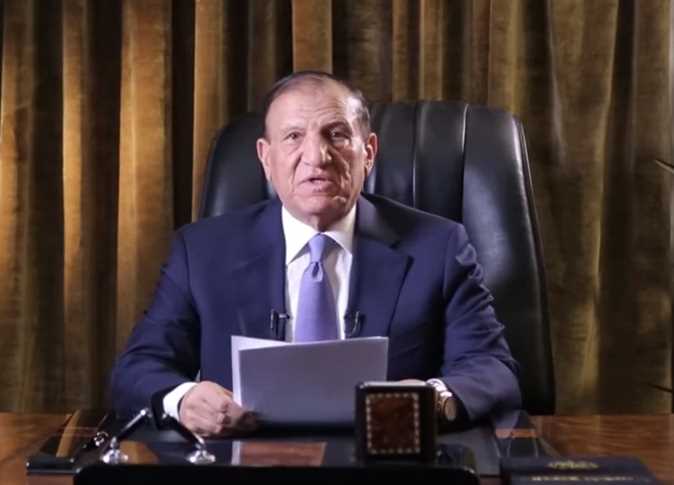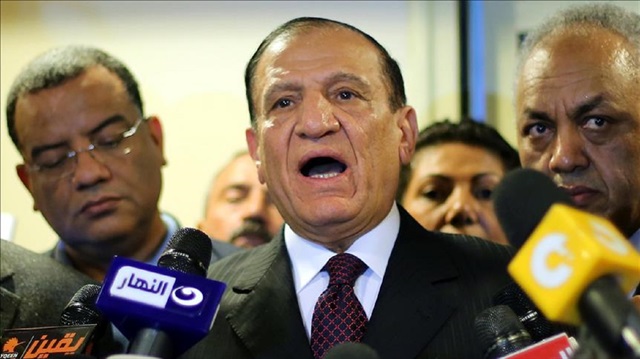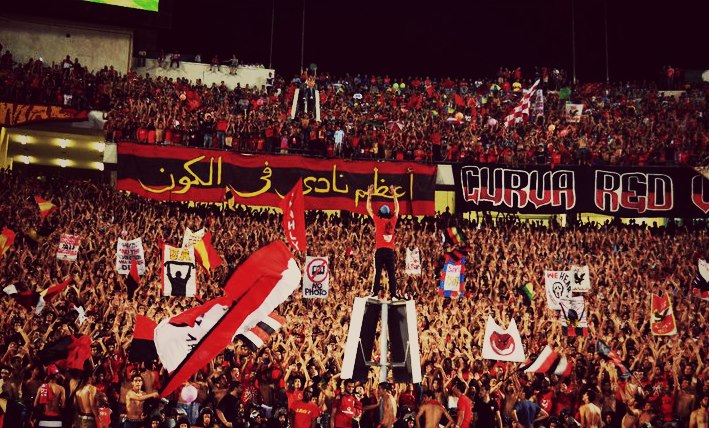Monday’s papers focus their coverage on three main developments. Topping the news are the Ultras Ahlawy and their stand to prevent the convening of matches until justice is served in the trial of Port Said Stadium killings. Also capturing headlines are the dozens of lawsuits filed against Field Marshal Hussein Tantawi and former Armed Force Chief of Staff Sami Anan — the former top two members of the Supreme Council of the Armed Forces — and an open-ended “teachers’ uprising” due to commence today.
The hardcore football fans, known as ultras, have captured headlines in all daily papers today. Ultras Ahlawy staged minor protests outside the Borg al-Arab Stadium Sunday, where dozens of Ultras Ahlawy “Devils” called for the cancellation of Egypt’s “Super Cup” matches until justice is served in the trial of those behind the killings of 74 football fans in Port Said in February.
The ultra’s demand for the cancellation of the “Super Cup” has been endorsed and supported by a number of different political parties and currents. In independent Al-Shorouk, the headline reads, “Ultras surround hotel housing the Ahly and ENPI teams” in Borg al-Arab, referring to their bid to cancel matches. Independent newspaper Al-Watan details police preparations in Alexandria: “Thirty divisions of the Central Security Forces deployed, along with police dogs and undercover officers, to secure the Super Match.”
Police forces had been placed on high alert ahead of these protests in Borg al-Arab, in apprehension of security concerns associated with the ultras’ earlier threats regarding the storming of the football pitch to prevent the game from taking place. Ultras had claimed police forces were instigating locals against these hardcore football fans ahead of the match. According to Al-Shorouk, “Tribal leaders claim there was no coordination or agreement between them and the police regarding the presence of the ultras in their town.”
Also in Al-Shorouk, the Muslim Brotherhood’s chief financier and deputy guide, Khairat al-Shater, “demands an apology from the Freedom and Justice” newspaper for publishing criticisms of the ultras in the mouthpiece of the Brotherhood’s political arm, the Freedom and Justice Party. Independent Youm7 newspaper writes, “Shater attacks the Freedom and Justice paper due to its stance against Ahly fans.”
On his private Twitter account, Shater wrote, “Allowing the Super Cup matches in the name of safeguarding the state’s stature is a manipulation of a rightful demand.” The multimillionaire Islamist added, “Preserving the state’s stature will be realized when the real perpetrators of the Port Said massacre are brought to justice.” Shater called on Freedom and Justice to issue an apology to Ultras Ahlawy.
However, the ultras did not seem to accept Shater’s apology on behalf of the Brotherhood. According to the liberal opposition Al-Wafd newspaper, “Ultras league criticizes Shater’s apology, describes it as being a sponge to soak up their anger.”
Backtracking his original comments published in the Freedom and Justice newspaper, Editor-in-Chief Adel al-Ansary writes an op-ed titled “Ultras are not to be blamed.” Ansary’s whitewashing article mentions that ultras were an integral part of the 25 January revolution and are an important revolutionary force. However, the he also points out that a few members of the ultras were involved in unwarranted acts of violence, including a previous attack on the Egyptian Football Federation.
In related news, Ahly football team’s star striker, Mohamed Abu Treika, has stood in solidarity the ultras’ demands for a cancellation of the Super Cup matches until a just court verdict has been issued against those responsible for the killings of the 74 fans in the Port Said Stadium. According to Al-Watan, Abu Treika may thus be subjected to disciplinary actions for boycotting matches, including the docking of 20 percent of his annual income. Abu Treika earns an estimated LE5 million each year (over US$830,000).
In other news, the SCAF’s former top officers, Tantawi and Anan, are being pursued in the courts. Both are accused of killing dozens of peaceful protesters since the 25 January revolution, while the Anan is also being accused of corruption and financial irregularities.
President Mohamed Morsy retired both Tantawi and Anan on 12 August, but he also decorated them with top medals and appointed them as presidential advisers. Al-Tahrir, an independent paper, writes, “Lawsuits start piling up against Tantawi and Anan.”
The article mentions that aside from the killings of peaceful protesters, assaults, virginity checks and more than 12,000 military trials against civilians have spurred these charges against the two generals. Anan is also being accused of illegally acquiring plots of land for real estate for private gains.
These charges have been filed before the public prosecutor’s office and military prosecutors. Al-Shorouk mentions that 26 such charges have been presented to military prosecutors, though prosecuting authorities have not yet taken action against either Tantawi or Anan. The April 6 Youth Movement activist group is among those filing complaints, along with various human rights groups.
In other news, a “teachers’ uprising” is due to start. Organized by independent teachers syndicates, this “second teachers’ uprising” is scheduled to take place immediately before the beginning of the academic year. A similar action involving teachers’ protests and strikes was held around the same time last year.
“Teachers threaten to freeze the academic year,” reads the top headline in party paper Al-Wafd. Al-Watan writes, “Following failure of negotiations with Morsy, ‘Teachers’ Second Uprising’ launches today.” Thousands of teachers have been demanding a monthly minimum wage of LE3,000 ($500) improved working and teaching conditions, an incremental pay raise system, additional public spending on education and the end of private tutoring lessons, among other demands.
Dozens of teachers have been protesting in Nile Delta cities over the past couple of days in the run up to Monday’s scheduled nationwide protests. Al-Watan also mentions that teachers’ strikes will commence in Cairo, Alexandria and Port Said. In Cairo, an open-ended sit-in protest is to be held at the Saad Zaghloul Mausoleum, near Education Ministry.
In other developments, the top headline in the state-owned Al-Ahram newspaper reads, “Foreign-funded NGOs threatened national security and incited against the army and police.” The article cites former Planning and International Cooperation Fayza Abouelnaga who claims that numerous American NGOs were illegally receiving funding without licenses.
Abouelnaga’s statements come as part of the ongoing investigations against 43 foreigners and Egyptians accused of receiving foreign funding for unlicensed NGOs. The trial has been adjourned until 2 October. The investigations and legal actions commenced in December of last year.
During Sunday’s court hearing, Abouelnaga claimed that these unlicensed NGOs “have unknown objectives.” Despite this statement about their unknown objectives, the ex-minister then testified that “these NGOs sought to establish TV stations and shows, as well as establishing illegal organizations which threaten national security.”
Abouelnaga added that “there are recordings which point to US NGOs instigating locals against the army and police forces.” In Al-Shorouk, Abouelnaga claims, “I have recordings of these NGOs which incite against the army and police.” The former minister also claimed that 68 of these unlicensed NGOs received $US60 million in funding which was not registered with the Egyptian government.
In Al-Ahram, Abouelnaga is quoted as saying that between February and May 2011, the US side “spent $105 million on projects for awareness raising and democratic reforms.” Yet she claimed American NGOs vied to instigate Egyptian youth against the security forces to protest the state and to attack its institutions.
Egypt’s papers:
Al-Ahram: Daily, state-run, largest distribution in Egypt
Al-Akhbar: Daily, state-run, second to Al-Ahram in institutional size
Al-Gomhurriya: Daily, state-run
Rose al-Youssef: Daily, state-run
Al-Dostour: Daily, privately owned
Al-Shorouk: Daily, privately owned
Al-Watan: Daily, privately owned
Al-Wafd: Daily, published by the liberal Wafd Party
Youm7: Daily, privately owned




